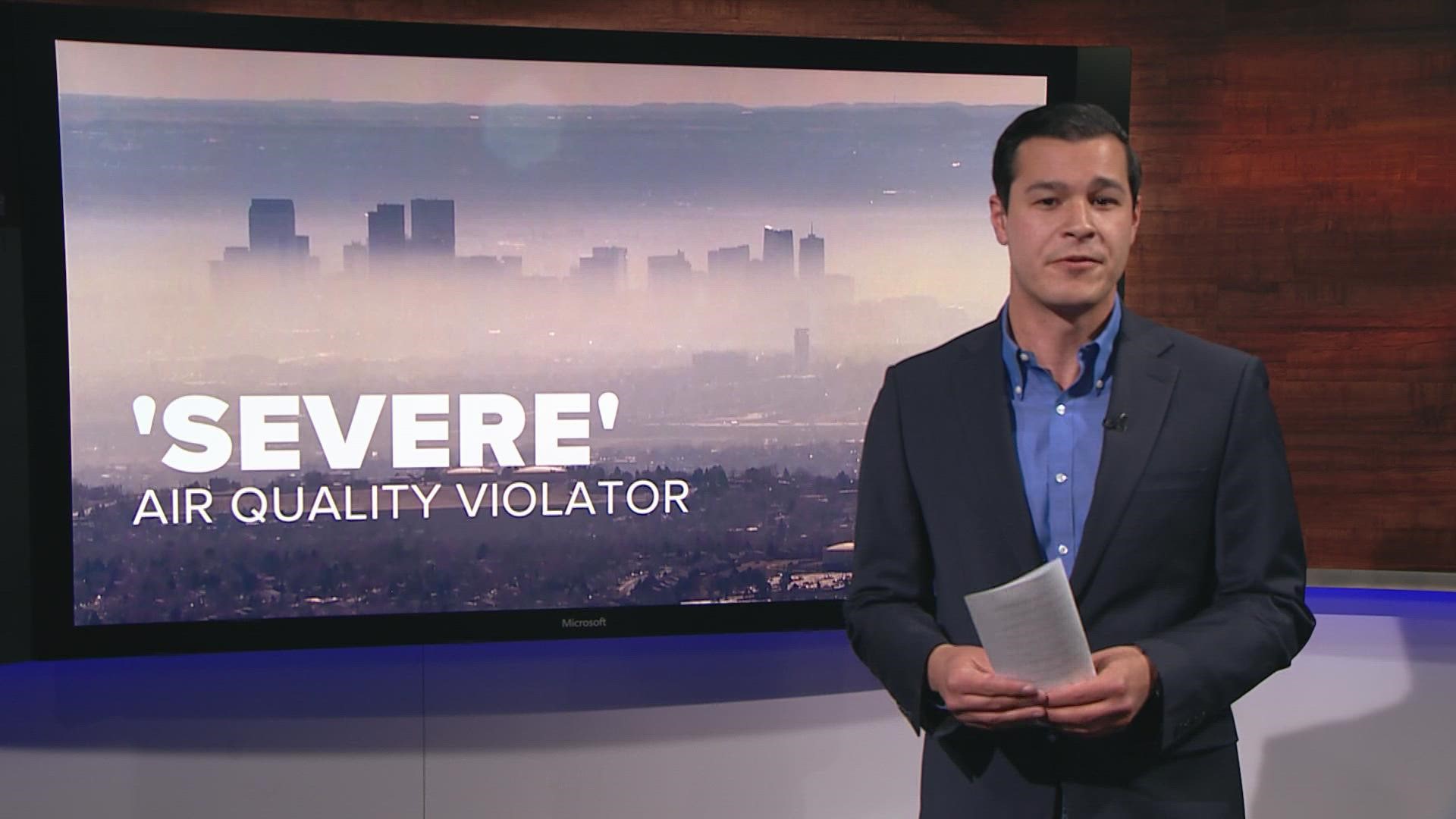DENVER — Citing a failure to achieve federal ozone standards, the Environmental Protection Agency (EPA) on Tuesday suggested downgrading Colorado's Front Range status from "serious" to "severe." If finalized, the update could mean new environmental permits for businesses and modified, more expensive gasoline.
Reclassification
The EPA judged the Denver area based on 2008 ozone National Ambient Air Quality Standards (NAAQS), as required by the Clean Air Act. These standards require an ozone standard below 75 parts per billion, essentially capping the amount of sulfur dioxide allowed in the air. The goal was expected to be achieved by July 2021.
The EPA looked at data from the three most recent and complete calendar years for its analysis. The Front Range failed to attain the goal, with an ozone measurement of 81 parts per billion. Five other areas -- Chicago, Dallas-Fort Worth, Houston, New York and Morongo Band of Mission Indians (tribal land in California) -- failed to attain the standard, as well.
All parts of the country now considered to be "severe" have until 2027 to meet the standard. Each state containing a severe area must also submit an implementation plan within 18 months that explains how they will address the reclassification.
The EPA assesses regions based on 2015 NAAQS, as well, which have a more rigid standard of 70 parts per billion. The Denver area's grade moved from "marginal" to "moderate" on that scale.
Weather
Each of the three summers used to assess ozone standards (2018, 2019 and 2020) finished considerably warmer than average in Denver and along the Front Range.
Generally speaking, warmer temperatures increase the amount of ground-level ozone and pollutants. Heat and sunlight trigger ground-level ozone, and scorching summertime temperatures along the Front Range are likely the primary driver behind the three-year spike in pollutants.
The smog, the EPA said, comes from cars, power plants and other industries, and is most dangerous on hot, sunny days in urban areas.
"Smog pollution is a serious threat to public health, increasing the likelihood of respiratory infections, asthma attacks, and hospital visits,” EPA Administrator Michael S. Regan said in a press release. “With these proposed determinations, we are fulfilling our duty under the Clean Air Act to monitor air quality and work with states to help reduce pollution and protect the public we serve.”
What would this mean?
Nothing is final until after a 60-day comment period.
If a severe status is approved, the classification would trigger changes in Colorado:
- Conventional gasoline would be replaced with federal reformulated gasoline in summer months, starting one year after the reclassification.
- Colorado currently has 260 active "major source facilities," or major source polluters. Reclassification could result in 470 businesses being added to that category, which would require changes to be in compliance, according to the Colorado Department of Public Health and Environment (CDPHE).
Michael Orlando is a former petroleum engineer who is now a managing director with Econ One and an adjunct professor in the Global Energy Management Program at the University of Colorado Denver Business School. Regarding the gas modification, Orlando estimates that there could be about a 5-10% increase in prices at the pump during the summertime because of the sale of reformulated gas, if the reclassification is approved.
"So at current prices, that would be about a 25 cent increase in price per gallon," he said.
Though geopolitical issues like the war in Ukraine, for example, as well as supply chain disruptions would be more likely to drive up gas prices than a summer's worth of selling reformulated gas, Orlando added.
"The bigger issue than I think the price premium that gets added to a gallon of gas is that during a reformulation season, you might only be purchasing from a very limited set of refineries around the country, or even in a particular region," Orlando said.
"So, if you have a supply chain disruption specific to those suppliers during the reformulation season, then you'll see prices spike dramatically just in those reformulations in the reformulation area that's buying from that bit of the supply chain that got disturbed."
Next Question: Would a tougher EPA standard affect DIA?
When it comes to the permitting process for the "major source facilities" list, Mike Silverstein, the executive director of the Regional Air Quality Council, acknowledges that the requirements become more stringent for the industrial facilities in the region.
"They either have to implement cleaner processes -- they have to add pollution control equipment, they have to maybe change the number of hours of operation that they undertake a year to stay under the new limits," Silverstein said.
"And what that means is they not only have to get a new permit, which is kind of a paper exercise, an administrative act, but with that, they're assessed for what emission reductions need to be made above or above what they've already done."
The Suncor refinery in Commerce City is considered a "major source facility."
A spokesperson for the refining facility told 9NEWS in a statement that they're, "...preparing to be in a position to produce reformulated gasoline (RFG) in the event it is required during the summer of 2023."
"As the state’s only refining facility, Suncor plans to be a part of Colorado’s energy future, producing the fuels Colorado needs, while making sound investments and driving environmental improvements," the statement read.
Colorado response
CDPHE is welcoming the proposed change.
The department said in a press release that the change would allow the state to hold a larger number of air pollution sources accountable and require them to commit to specific ways of lowering their emissions and pollution.
SUGGESTED VIDEOS: Full Episodes of Next with Kyle Clark


